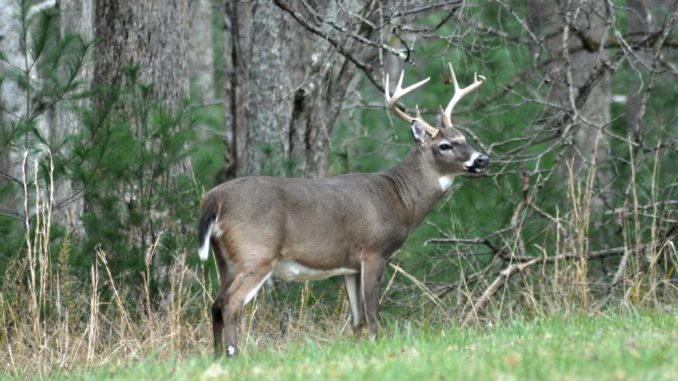
Legislature wants restrictions on deer-farming relaxed
The N.C. Wildlife Resources Commission will meet today and on Thursday morning in Raleigh to discuss a number of issues involving fish and wildlife in the state, but none is likely to be bigger than a proposal that would increase the number of deer farms.
At the heart of the discussion is the threat of Chronic Wasting Disease entering North Carolina’s penned cervids – whitetail deer, elk, fallow deer and red deer – and then the wild herd of whitetails. Supporters of deer-farming want the Commission’s existing strict sanctions against the movement of pen-raised deer relaxed so that more farms can be created, and more animals can be more easily moved between enclosures. And they want the Commission to share management of deer in pens with the N.C. Department of Agriculture.
Commissioners will discuss the topic in meetings this afternoon, with a final vote likely to take place on Thursday morning at the meeting of the full Commission, which begins at 9 a.m. at the agency’s headquarters on Varsity Drive on N.C. State’s Centennial Campus.
CWD is a disease that attacks the central nervous system of cervids. It is always fatal and has wiped out thousands of animals in the United States and Canada since it first appeared in 1967 in a Colorado enclosure. To date, CWD has been detected in 21 states, including Virginia.
“The (Commission) has had a perfect record — no CWD — in North Carolina for about the last 11 years,” said Richard B. Hamilton, a former executive director of the Commission and current executive director of the N.C. Camouflage Coalition. “A lot of deer hunters and other people don’t understand why anyone would want to change our success rate in keeping CWD out of this state.”
The state chapter of the Quality Deer Management Association and the N.C. Wildlife Federation have weighed in against changing how deer farms are managed.
Hamilton is wary of the new legislative rule because it bans the Commission from using rules that are more restrictive than U.S. Department of Agriculture regulations for penned-deer management.
“(Opposition) killed the deer-transport part,” Hamilton said, “but it’s possible new (NCDA) authority could make it easier for CWD to get into the state.”
He also said that decisions on the management of penned deer could be put in the hands of the NCDA.
“Captive deer might not be considered wild animals anymore, but cattle,” Hamilton said. “Agriculture could overrule the Commission.”
That may mean looser rules for transport of interstate deer, as is done with cattle — which could increase the possibility of CWD entering the state.
Hamilton pointed out Pennsylvania followed USDA deer rules and has now documented CWD within its borders.
“It doesn’t make much sense to adopt rules we already know haven’t worked well in keeping CWD out of a state,” he said.
The legislation was added to the 2014 budget bill that was passed by both houses of the Republican-controlled N.C. General Assembly.
One huge question is whether the 19 members of the Commission – appointed by Gov. Pat McCrory, Speaker of the House Tom Tillis and President of the Senate Phil Berger – oppose the legislature’s intent in the budget act that McCrory signed in August.
“The commissioners are having a hard time doing what’s right,” Hamilton said. “Deer hunters have come out (at public meetings) and said we need to take care of our (wild) deer, and they don’t want to increase the chance CWD will get into this state’s deer.”




Be the first to comment